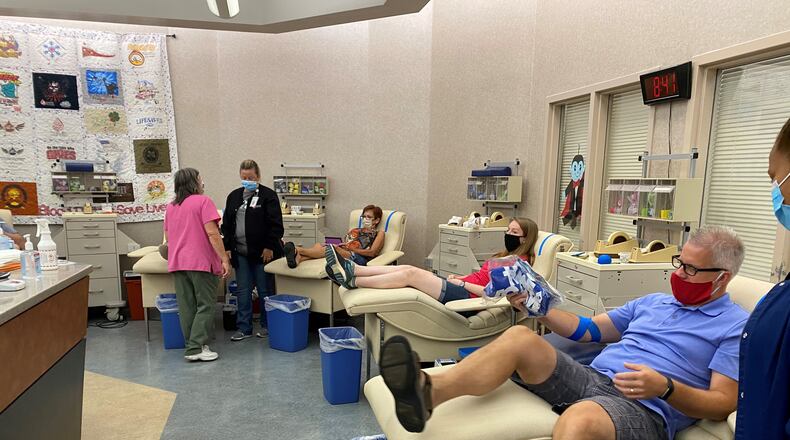From March through the end of June, the blood center had 268 blood drive cancellations representing a loss of 8,500 units.
“Our main product is donated. It’s linked to volunteerism. And that was in jeopardy every single day,” said Mark Pompilio, marketing manager for the Community Blood Center.
With elective procedures at one point cancelled, that lowered need for blood by about 20 to 25% in the region, but by late May into early June with the relaxing of stay-at-home order, hospitals were encouraging return to elective surgeries and treatments and normal procedures. And the Community Blood Center had to increase collection to keep pace.
“But we’re back to pre-COVID levels where we’re way back up there, because guess what? Those surgeries needed to happen. They aren’t ‘elective’ elective, they’re just not emergencies,” said Diane Wilson, chief operating officer.
From June into July, there were unprecedented supply shortages. The blood center was forced to shuffle blood allotments among hospitals and import blood from outside blood centers.
“We have not had to cancel any surgeries. We have not had to put hospitals on notice of not doing elective surgeries. But a couple weeks ago, we came pretty darn close. And we all got scared. And we imported blood from outside,” Wilson said.
With the wave of cancellation, the blood center also missed the chance to get high schoolers interested in donating blood, which can be a key experience to getting someone excited as a life time donor. The staff worry about the long-term impact of not getting that group interested in being blood donors as adults.
“That gets people excited about blood donation. It might be their first blood donation,” Wilson said.
In the mean time, along with keeping up donor moral, they also have to keep up staff moral and keep up staffing levels in general.
Employee training takes time and not all phlembotomy training programs have resumed hands on training needed to complete the course work, Amanda said. People get sick, have child care issues or are otherwise unable to come in and it’s hard to fill those positions. The roughly 220 employees who work at the Community Blood Center have been stretched thin, with overtime to cover gaps in positions they can’t fill.
“All of that hands on training has disappeared that feeds into us,” Wilson said.
At first, when elective surgeries were suspended and others fearfully stayed home from the doctor, there was unprecedented low use of blood which was enough to offset the unprecedented low collections.
In early March, there were the beginning of questions, concerns and first blood drive cancellations. Schools began extending spring breaks, and that was the beginning of school blood drive cancellations.
By mid-March, there was the “stay at home” order in Ohio and business shut-downs. The blood center started their “Donor Strong” blood drive drives and mass donations at Dayton CBC helped with a stockpiling of blood.
By April, Pompilio said he had never seen anything like the widespread blood drive cancellations across entire calendar — he even took a picture of his calendar with a shocking streak of cancellations written across the days.
That month the blood center escalated protocols in sanitation, temperature testing, social distancing, appointments to donate, staff wearing masks, specially assigned staffing, discontinued use of bloodmobiles – eventually escalated to mandatory mask wearing by all donors and mandatory appointments.
The supply is stabilizing and usage continues to rise but with limited new donors.
Donors must make an appointment and wear a face mask. Schedule your donation at www.DonorTime.com or call (937) 461-3220.
About the Author
